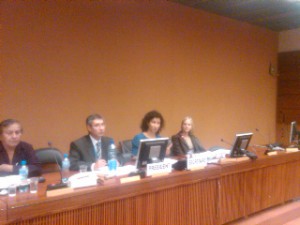Edited by Evan Welkin

Gina Patnaik (third from left) represents Rachel Corrie Foundation in Geneva.
On November 9, 2010, The U.N. Human Rights Council in Geneva released its draft report on the first Universal Periodic Review (UPR) of the U.S. human rights record. The Universal Periodic Review was established by the U.N. General Assembly in 2006 to review human rights records of all 192 U.N. member states. The 2010 report calls for greater transparency and accountability in U.S. foreign military aid and programs. The Rachel Corrie Foundation was one of numerous non-governmental organizations to provide written submissions for the UPR of the U.S.
On Thursday, November 4, Gina Patnaik, a cousin of Rachel Corrie and PhD candidate at the University of California – Berkeley, spoke at UN headquarters in Geneva, representing the Rachel Corrie Foundation in a side panel to the U.S. review. Patnaik called upon the U.S. Government to strengthen two existing mechanisms for monitoring human rights abuses – the Leahy Amendment, and the Country Reports on Human Rights Practices. The Leahy Amendment is part of U.S. foreign assistance legislation and states that the U.S. must review all credible evidence of human rights violations committed by foreign militaries and hold its foreign aid beneficiaries accountable to international law.
In Geneva, Ms. Patnaik explained that there are systemic flaws in U.S. implementation of both the Leahy Amendment, and the Department of State’s annual Country Reports on Human Rights Practices that prevent the government from effectively identifying and remedying gross human rights violations by countries receiving U.S. aid. Patnaik stated that multiple sources have provided credible evidence of a persistent pattern of human rights violations committed by the Israeli military. However, to date, the U.S. Department of State has not conducted an investigation under the Leahy Amendment into any Israeli military violations of human rights law.
Ms. Patnaik spoke, also, about the Corrie family’s ongoing efforts to seek accountability from Caterpillar, Inc. Katherine Gallagher, Senior Staff Attorney at the Center for Constitutional Rights (CCR), spoke about the U.S. justice system’s failure to hold corporations accountable for complicity in human rights violations. The CCR and the Ronald A. Peterson Law Clinic at Seattle University School of Law, filed suit against Caterpillar, Inc. on behalf of the Corries and Palestinian family members killed or injured with Caterpillar machines. Gallagher detailed ways that failure to monitor corporate involvement in human rights violations continues to undermine the U.S. commitment to international human rights law.
A high level U.S. delegation presented the U.S. UPR report on November 5th and answered questions from more than 50 nations about the U.S. human rights record. The delegation noted “President Obama’s and Secretary Clinton’s deep commitment to multilateral engagement, human rights, and the rule of law.” The U.S. delegation stated, “By admitting the possibility of imperfection, new opportunities to improve are revealed…” The delegation will return to the UN in March 2011 to discuss its efforts to address the 228 recommendations made during the UPR.
The Rachel Corrie Foundation applauds U.S. participation in the UPR and encourages the U.S. Government to fully comply with current laws governing foreign military assistance and the Congressional mandates for accurate and complete reporting of human rights violations in the annual Country Report on Human Rights Practices.





